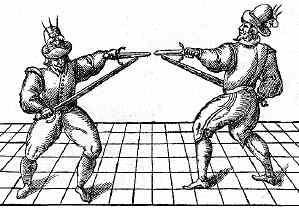Later Elizabethan dramatists
The London stage in about 1600 was alive with new plays, new dramatists, new ideas --and inevitably there was "much throwing about of brains*." One particular episode is known as the War of the Theatres, a controversy that gives a fascinating insight into the rivalries and interconnections of the various dramatists of the time.
Two contemporaries of Ben Jonson, Dekker and Marston, satirized Jonson's pride* in a play they wrote jointly, Histriomastix. Jonson replied in his Poetaster--Marston's style in particular is mocked, as Jonson makes the character representing Marston vomit up a series of indigestible words. Marston and Dekker replied in Satiromastix, getting their revenge by making fun of the slowness of Jonson's writing process*.
Click to read more about each writer:
Footnotes
-
Brain-battling
Rosencrantz makes a topical reference to the War of the Theatres:
Rosencrantz: Faith, there has been much to-do on both sides, and the nation holds it no sin to tarre [goad] them to controversy. There was, for a while, no money bid for argument [a plot] unless the poet and the player went to cuffs in the question.
Hamlet: Is't possible?
Rosencrantz: O, there has been much throwing about of brains.
(Hamlet, 2.2.359-66) -
Somewhat less than modest
Jonson, in his satirical Court play-cum-masque, Cynthia's Revels, had created a character (Criticus) representing himself, and had Cynthia (the Queen) speak glowingly to him.
-
Slow on the uptake
In his play The Poetaster, Jonson had cast himself (with characteritsic hubris) as the Roman poet and arbiter of taste, Horace; in Satiromastix, Horace is shown painfully composing an ode (he has difficulty finding a rhyme), then later quoting it as if he had spontaneously conceived it.
-
Thomas Heywood (c. 1570-1641)
Heywood claimed to have had "at least a main finger" in over 200 plays--of which no more than 20 survive. He was an actor in a modest company (The Earl of Worcester's Men), and specialized in writing plays for the citizens of London, a genre often called "citizen comedy," the best example of which is by Dekker.
His best play is an uncharacteristic domestic tragedy, A Woman Killed with Kindness, though changes in attitudes make it hard for the modern reader to take it altogether seriously.
-
Thomas Dekker (1572-1632)
Like Thomas Heywood, one of the most prolific writers of the period, Dekker wrote both plays and pamphlets that celebrate and illustrate uniquely the quality of ordinary life in London.
Most of his plays were written in collaboration with others, and some evidently with great speed. The Shoemaker's Holiday, still performed today, is both a romantic and a realistic representation of the middle-class world of trades and increasing wealth (it tells the success story of Simon Eyre, a shoemaker who became Lord Mayor of London).
Collaboration and criticism
It is a regrettable fact that modern critical approaches depend largely on the comparison of one work by a given author with another: we are thus ill-equipped to discuss the work of someone who spent much of his time writing with others. Thus many worthwhile plays are neglected because their author cannot be identified, or because there were multiple authors.
The Honest Whore, Part One, written in collaboration with Middleton, is available on line. Selected poetry by Dekker is available on line.
